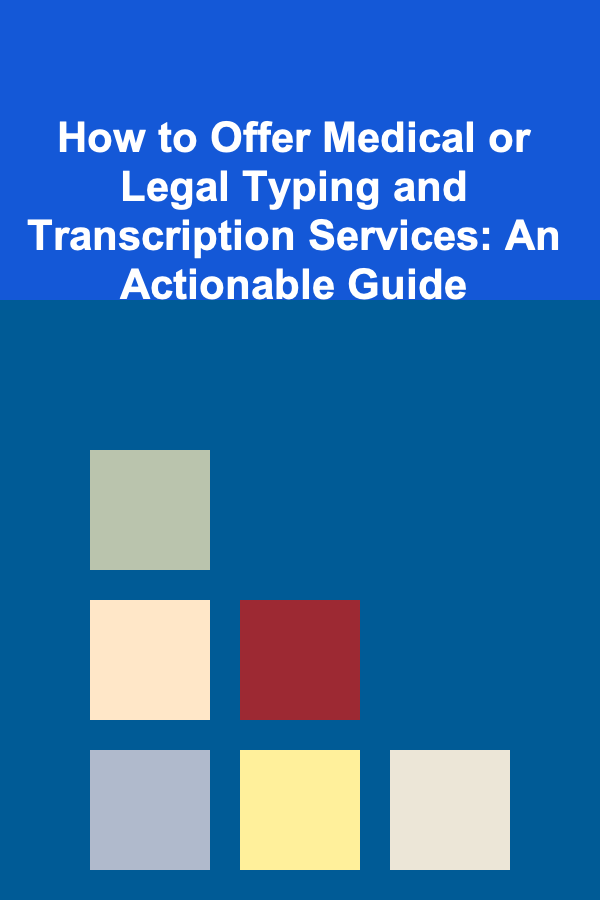
How to Offer Medical or Legal Typing and Transcription Services: An Actionable Guide
ebook include PDF & Audio bundle (Micro Guide)
$12.99$11.99
Limited Time Offer! Order within the next:

Offering medical or legal typing and transcription services can be a rewarding and lucrative business venture. Both the medical and legal fields require high accuracy and attention to detail, making transcription services in these sectors particularly in demand. Whether you're a skilled typist or someone interested in entering this field, there are steps you can take to establish yourself as a trusted professional in the industry.
In this actionable guide, we'll walk you through how to offer medical and legal typing and transcription services, from understanding the skills required to marketing your business effectively.
Understand the Specialization
Medical Transcription
Medical transcription involves transcribing medical dictation from doctors, nurses, and other healthcare professionals. These dictations typically include patient histories, physical exam reports, treatment plans, and other clinical documents. In this field, accuracy is paramount, as transcription errors can have serious consequences for patient care.
Key areas to focus on:
- Medical Terminology: You need to have a strong understanding of medical terminology, abbreviations, and procedures. This knowledge will help you accurately transcribe what the medical professional dictates.
- Confidentiality: Patient information is highly sensitive. In many regions, including the United States, medical transcriptionists must adhere to regulations like HIPAA (Health Insurance Portability and Accountability Act), ensuring that all patient information is kept confidential.
- Formatting: Medical transcription often follows specific formatting standards based on the healthcare institution's requirements. Knowing these formats will make your work more professional and acceptable.
Legal Transcription
Legal transcription involves transcribing dictations and recordings from attorneys, paralegals, and other legal professionals. These transcriptions typically include court hearings, depositions, client consultations, contracts, and case summaries. Legal transcriptionists must be familiar with legal terminology and the structure of legal documents.
Key areas to focus on:
- Legal Terminology: Understanding legal jargon is critical. This includes terms related to contracts, lawsuits, court procedures, and various areas of law (criminal, corporate, civil, etc.).
- Accuracy and Detail: Legal documents often have tight deadlines and require very high accuracy. Any mistake in transcription can lead to legal complications, so meticulous attention to detail is essential.
- Formatting: Legal transcription follows its own set of formatting guidelines, which can vary by law firm or jurisdiction. A legal transcriptionist must be familiar with these to ensure proper document presentation.
Develop Essential Skills and Tools
Skills Required
- Typing Speed and Accuracy: The faster and more accurately you can type, the more efficient and profitable your transcription service will be. A speed of 60-80 words per minute (wpm) is typical, but higher speeds are better.
- Listening Skills: As a transcriptionist, you'll be listening to audio recordings, so it's important to be able to clearly understand diverse accents, speech patterns, and background noise.
- Attention to Detail: Whether it's legal or medical transcription, precision is key. You need to be able to catch every word and accurately transcribe it.
- Research Abilities: You'll often encounter medical or legal terms that you're not familiar with. Strong research skills are necessary to ensure accuracy.
- Time Management: In both fields, deadlines can be tight. Developing time management skills will help you handle multiple tasks and meet client expectations.
Tools Required
- Transcription Software : Software like Express Scribe, Otter.ai, or Dragon NaturallySpeaking can help you transcribe faster and more accurately. Some software includes features like foot pedal control, which allows you to pause, rewind, and play audio hands-free while typing.
- High-Quality Headset: A good headset with noise-canceling features will help you hear the recordings clearly, especially when dealing with medical or legal jargon.
- Word Processing Software: Most transcription is done using word processors like Microsoft Word or Google Docs, which allows for easy formatting and editing.
- Foot Pedal: While optional, a foot pedal allows you to control audio playback hands-free, which can significantly increase your transcription speed.
Get Trained and Certified
While it's possible to start without formal training, specialized courses can give you a competitive edge. Certification programs for both medical and legal transcription are available and often necessary to gain credibility in these fields.
Medical Transcription Certification
Organizations like the Association for Healthcare Documentation Integrity (AHDI) offer certification programs like the Certified Healthcare Documentation Specialist (CHDS). These programs ensure that you have the necessary knowledge of medical terminology, documentation practices, and ethical standards.
Legal Transcription Certification
The National Verbatim Reporters Association (NVRA) offers certifications for legal transcriptionists. The Certified Legal Transcriptionist (CLT) credential is recognized in the industry and demonstrates proficiency in legal terminology and transcription practices.
Although certification is not always required, it can help you stand out and make clients more confident in your abilities.
Build Your Portfolio and Gain Experience
Start with Small Projects
If you're new to transcription, you can start by offering services on freelancing platforms like Upwork , Fiverr , or Freelancer. Starting with smaller projects allows you to build your experience and credibility.
Volunteer for Experience
Another way to gain experience is by volunteering to transcribe for local legal firms or healthcare providers. This can be an excellent way to practice your skills while building a professional network.
Offer Trial Services
If you have experience but don't yet have a portfolio, offer free or discounted services to a few clients in exchange for testimonials. A strong portfolio of your work will help you secure higher-paying clients in the future.
Pricing Your Services
Pricing can vary widely depending on the complexity of the work, the length of the audio, and your level of experience. When starting out, you may want to offer competitive rates to attract clients, then gradually increase your prices as you gain experience and build a reputation.
Medical Transcription Rates
For medical transcription, rates usually range from $0.07 to $0.15 per line of transcription, though this can vary depending on the difficulty of the material and the turnaround time.
Legal Transcription Rates
For legal transcription, you can expect rates of $1 to $3 per minute of audio, depending on the complexity of the material. Legal transcription is often paid at a higher rate due to the specialized knowledge required.
It's essential to research local market rates and adjust your pricing accordingly. You could also charge hourly rates, which typically range from $25 to $100 per hour.
Set Up Your Business
Whether you want to work as a freelancer or set up a larger business, there are a few essential steps to take:
Register Your Business
If you're serious about offering transcription services, register your business with your local government. This may involve choosing a business name, registering for taxes, and getting a business license.
Set Up Payment Methods
You'll need a reliable way to collect payments. Options include PayPal, bank transfers, or even invoicing software like QuickBooks or FreshBooks to manage your finances.
Create Contracts
Ensure that you have clear contracts with clients outlining the scope of work, payment terms, confidentiality requirements, and deadlines. This can protect both you and your clients.
Market Your Services
Marketing is crucial to attracting clients. Here's how you can get the word out about your medical and legal typing and transcription services:
Build a Website
Having a professional website is essential for showcasing your services. Include a portfolio, testimonials, pricing details, and an easy way for clients to contact you. Ensure that your website is optimized for search engines (SEO) to attract organic traffic.
Network with Legal and Medical Professionals
Attend industry-specific conferences or join online groups and forums where doctors, lawyers, or legal assistants gather. Building relationships with professionals in these fields can lead to direct referrals.
Use Social Media
Platforms like LinkedIn and Twitter are useful for connecting with potential clients. Share relevant content, participate in discussions, and let people know about your services.
Partner with Agencies
Consider partnering with medical transcription agencies or legal firms that may need subcontractors for high-demand periods. These partnerships can provide a steady stream of work.
Ensure Compliance with Legal and Ethical Standards
Both medical and legal transcription involve highly sensitive information, and confidentiality is paramount. Make sure you are familiar with and comply with the relevant regulations:
- HIPAA (Health Insurance Portability and Accountability Act) for medical transcription in the U.S.
- GDPR (General Data Protection Regulation) in Europe for data protection
- Non-disclosure agreements (NDAs) may also be required by clients
Always make sure that you have systems in place to protect client information, including secure file storage and communication channels.
Conclusion
Offering medical or legal typing and transcription services can be both a fulfilling and profitable business. By understanding the specialized terminology, developing the necessary skills, gaining relevant certifications, and establishing an efficient workflow, you can set yourself up for success. Through a combination of networking, marketing, and delivering high-quality work, you can attract a steady stream of clients and build a sustainable business in this niche industry.

How to Maintain Clear Communication with Your Team
Read More
How to Organize a Tiny Kitchen for Maximum Functionality
Read More
How to Save Money on Groceries with Simple Budgeting Tips
Read More
The Comprehensive Guide to Graphic Design: Best Practices and Tools for a Successful Career as a Specialist
Read More
Unlocking Success as a Logistics Coordinator: A Comprehensive Guide to Operations Management
Read More
10 Tips for Lighting a Scene on a Tiny Budget
Read MoreOther Products

How to Maintain Clear Communication with Your Team
Read More
How to Organize a Tiny Kitchen for Maximum Functionality
Read More
How to Save Money on Groceries with Simple Budgeting Tips
Read More
The Comprehensive Guide to Graphic Design: Best Practices and Tools for a Successful Career as a Specialist
Read More
Unlocking Success as a Logistics Coordinator: A Comprehensive Guide to Operations Management
Read More